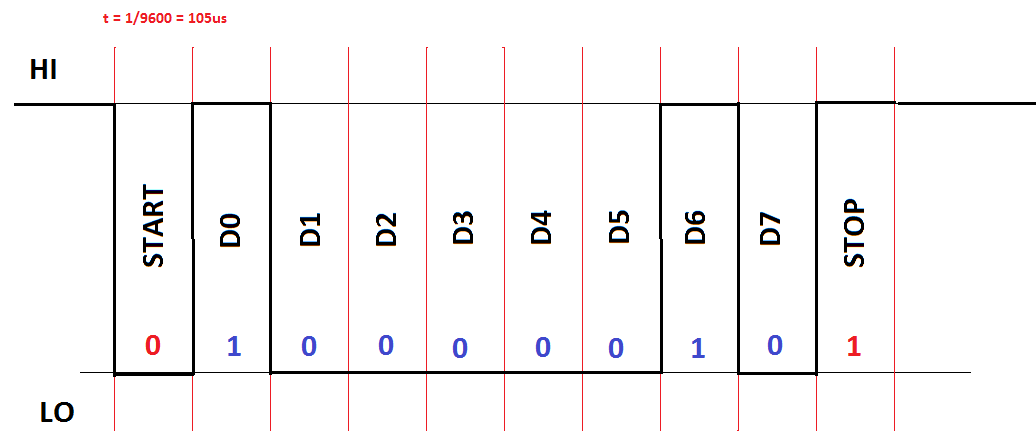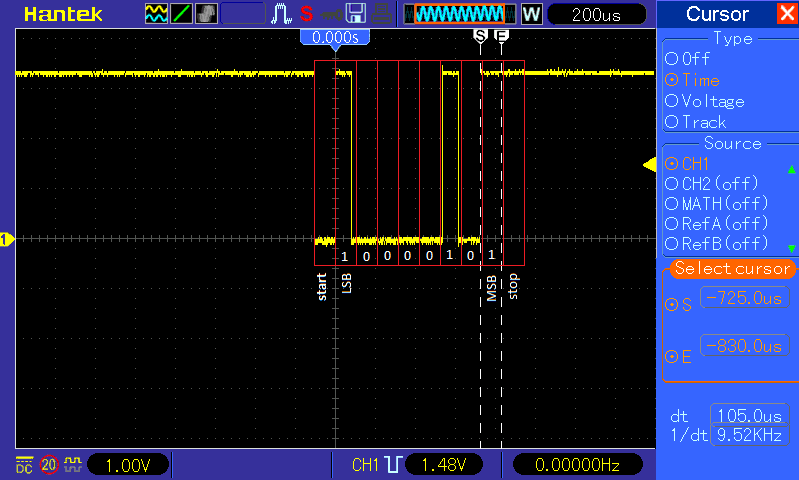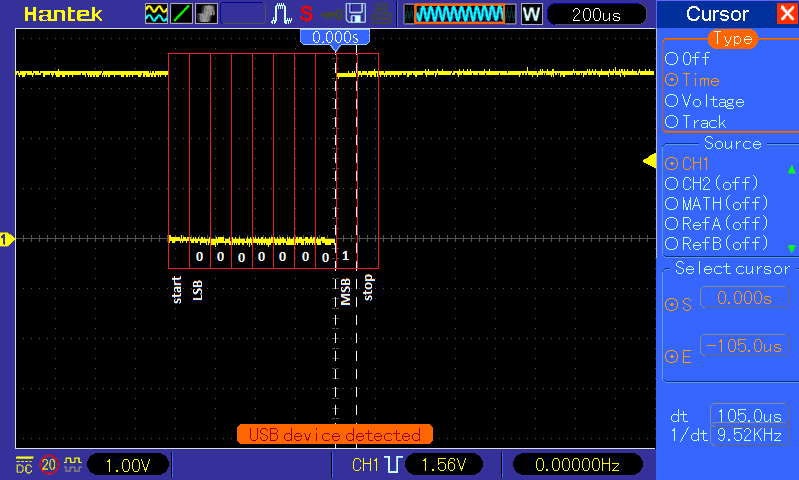I using MSP430FR6989 microcontroller (development board MSP-EXP430FR6989) to try and send a UART signal via it's TX pin
The configuration of the MSP430:
- Clock System 32.768 Khz
- Baud Rate 9600
- 8 bits, No Parity, LSB first, One Stop bit
- Using eUSCI_A0 module (Enhanced Universal Serial Communication Interface A0 module), and using P4.2 UCA0TXD pin
The premise of the mini-project is, when I press a button, a digital input isr is serviced, and an 'A' is transmitted via the UART module.
'A' = 0x41 = 0b 0100 0001
so if LSB bit is sent first it will be 1000 0010
following the character format of the UART Start D0 D1 D2 D3 D4 D5 D6 D7 Stop 0 1000 0010 1
 Section 30.3.2 of the MSP430 user guide
Section 30.3.2 of the MSP430 user guide
I expected the signal to look like this in the oscilloscope
However, when I debugged the UART TX pin using an oscilloscope, this is the signal that I got:
the char that I received is (from MSB to LSB): 0b 1010 0001 = 0xA1
I changed the code so that when I press a button a 0 would be written on the Transmit Buffer, but this is the signal I got from the oscilloscope:
I sent a 0 yet I received a 1000 0000
Note: I am not sure if this is relevant or not, but I pressumed time in the oscilloscope goes from left to right, however, the time cursor E is at 0.00 us and S is at -105us, which suggest that time goes from right to left.
That is part of my code that I think is relevant to the post FYI
Clock_Initialization.h
#ifndef CLOCK_INITIALIZATION_H_
#define CLOCK_INITIALIZATION_H_
void clock_initialization (void);
#endif /* UART_CLOCK_INITIALIZATION_H_ */
Clock_Initialization.c
#include <msp430.h>
#include "Clock_Initialization.h"
void clock_initialization (void)
{
//smclk and mclk = 8Mhz DCO
//is it possible to disable ACLK
CSCTL0 = CSKEY;//password in order to modify clock signal
CSCTL2 = SELA__LFXTCLK | SELS__DCOCLK | SELM__DCOCLK;
//ACLK -> LFXTCLK (32.768KHz) SMCLK & MCLK -> DCOCLK
//enable the LFXIN and LFXOUT pins PJ.4 and PJ.5 P84 and P85
PJSEL0 |= BIT4;//PJSEL0.4 = 1
PJSEL1 &= ~BIT4;//PJSEL1.4 = 0
}
Baud_Rate.h
#ifndef BAUD_RATE_H_
#define BAUD_RATE_H_
void baud_rate_setup (void);
#endif /* UART_BAUD_RATE_H_ */
Baud_Rate.c
#include <msp430.h>
#include "Baud_Rate.h"
void baud_rate_setup (void)
{
//baud rate 9600 clock signal 32.768 KHz
UCA0CTLW0 |= UCSWRST;
UCA0BRW = 3;
UCA0MCTLW = 0x9200;
}
UART.h
#ifndef UART_H_
#define UART_H_
#define UART_TX_BUF UCA0TXBUF
#include "Digital_Input_Output/Debounce.h"
//includes the enum Button datatype
/*
enum Button
{
Button0 = 0,
Button1 = 1,
Button2 = 2
}
*/
void init_UART (void);
void sendChar (enum Button x);
#endif /* UART_UART_H_ */
UART.c
#include <msp430.h>
#include "UART.h"
#include "Digital_Input_Output/Debounce.h"
//includes the enum Button datatype
void init_UART (void)
{
UCA0CTLW0 &= ~ (UCPEN | UCMSB | UC7BIT | UCSPB | UCSYNC);
//No Parity, LSB first, 8 bits, One Stop Bit, Ascyc.
UCA0CTLW0 |= UCSSEL__ACLK;//CS 32.768 KHz
UCA0CTLW0 &= ~UCSWRST;
P4SEL0 |= (BIT2 | BIT3);
P4SEL1 &= ~(BIT2 | BIT3);
}
void sendChar (enum Button x)
{
switch(x)
{
case Button0:
UART_TX_BUF = 'A';//0;//'A';
break;
//...rest of the code
}
in main.c
#include <msp430.h>
#include "Digital_Input_Output/Debounce.h"//have enum Button datatype
#include "UART/Clock_Initialization.h"
#include "UART/Baud_Rate.h"
#include "UART/UART.h"
//code
int main(void)
{
//code
clock_initialization ();
baud_rate_setup ();
init_UART ();
_BIS_SR (GIE);//enable global interrupt
while(1);
return 0;
}
#pragma vector = PORT1_VECTOR
__interrupt void Port1_ISR (void)
{
switch(P1IV)
{
//code
sendChar(Button0);
//rest of the code
}
Kindly help me with my issue.



